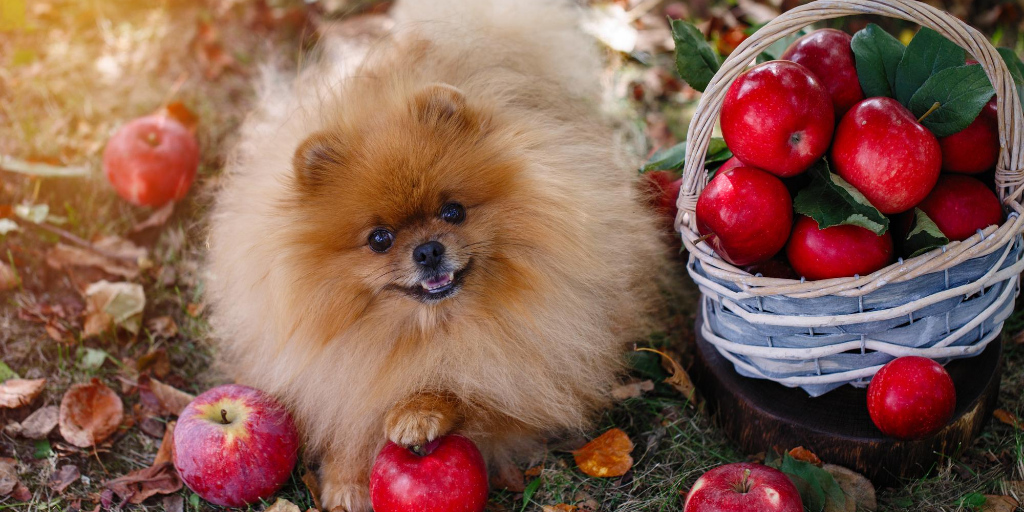As Autumn rolls around, it's time to look at what seasonal foods your dog can eat. In this article, we take a look at the sweeter side of produce - fruits. Just remember that even foods that are safe for dogs to eat are best given in moderation and with no seasoning or added sugar. Take a look at these Fall fruits to find out which ones your dog can and can't eat:
1. Apples
Yes! But not their seeds or stem.
Apples are a great treat for your dog. They are crunchy (which can be helpful for dental care) and full of nutrients, like vitamins, minerals and fiber. It's best to feed them in moderation, as they are high in sugar and their fiber content can cause an upset stomach. Also avoid letting your dog eat the seeds or core. This is because the seeds contain cyanide, which is toxic to dogs, and the core can be a choking hazard or cause intestinal obstruction.
2. Cranberries
Yes! In moderation.
Cranberries are generally safe for dogs to eat and can even have health benefits for your dog. These tart little fruits are low in calories but full of vitamins, minerals, fiber, antioxidants and other nutrients that support heart, stomach and immune health. Cranberries may also alleviate skin problems, which can help give your dog a healthy coat. But it's important to feed them to your pup in moderation, as too many can cause an upset stomach or lead to the development of calcium oxalate stones in the bladder.
3. Grapes
No.
Grapes and raisins are extremely toxic to all dogs, no matter the breed, gender or age. Ingesting this fruit can cause sudden kidney failure and end up fatal. Signs of grape ingestion toxicity include:
- Loss of appetite
- Lethargy, weakness and unusual stillness
- Vomiting and/or diarrhea (often within a few hours)
- Abdominal pain (stomach is tender when touched)
- Dehydration (signs of this include panting; dry nose and mouth; pale gums)
- Increased thirst and/or urine production or diminished amount of urine
- Kidney failure
It's critical that your dog receive treatment as soon as possible if he or she ingested grapes or raisins. Immediately contact your vet or a poison help hotline, like the ASPCA Poison Control Center. They may suggest you induce vomiting as soon as possible, though you shouldn't do so if your dog is having trouble breathing, exhibiting signs of distress or is unconscious.
4. Grapefruit
No.
Grapefruit should not be given to dogs. This is because they contain chemical compounds and essential oils that can cause digestive problems and other issues. Like lemons and limes, grapefruit contains a lot of citric acid, which can be harmful to your dog. In addition, the rind can be a choking hazard or cause intestinal obstruction.
5. Kiwis
Yes! But not the skin or seeds and in moderation.
Kiwis are okay for dogs to eat, without the seeds or skin, but should be considered more of a treat and given in moderation. They are, however, a very nutritious treat - they have more potassium than bananas and more vitamin C than oranges. Just make sure to remove the seeds because those are toxic to your dog. Also, remove the skin, as it can be a choking hazard or cause an upset stomach due to its high levels of insoluble fiber.
6. Olives
Yes! But not the pits and in moderation.
Olives (which are technically a fruit) are not toxic to dogs and can be safe in very small amounts. The flesh contains several vitamins, minerals, healthy fats and proteins. However, dogs who are fed a complete and balanced diet won’t need these additional nutrients and olives can add unnecessary calories, which can lead to weight gain. If you choose to feed your dog olives, make sure they don't have any pits because they are a choking hazard, can cause intestinal obstruction and even crack teeth. Also make sure the olives are not canned, pickled or seasoned.
7. Papaya
Yes! But not the pits and in moderation.
Papaya is safe for dogs to eat and is rich in fiber, vitamins and minerals, healthy enzymes and other nutrients. The fruit can help the health of your dog's heart, as well his or her digestive and immune systems. Like all fruit, however, papaya should be given in moderation as they are high in sugar and their fiber content can caus an upset stomach. In addition, do not let your dog eat the pit as it contains cyanide (which is toxic to dogs) and can be a choking hazard or cause intestinal obstruction if swallowed.
8. Pears
Yes! But not the seeds or core and in moderation.
Pears can be a healthy snack for your dog, when given in moderation and not on a regular basis. They are packed with vitamins, minerals and fiber. But because of this, too many can cause an upset stomach. Avoid giving your dog any part of the fruit with seeds because they contain traces of cyanide, which is toxic to dogs. The seeds can also be a choking hazard for smaller dogs, as can the pear core for dogs of all sizes.
9. Pomegranate
Technically yes, but with some caveats.
Pomegranates themselves are not toxic to dogs. They are full of antioxidants, fiber, vitamins and minerals that can have health benefits for your dog's brain and body. But the fruit can cause your dog to get an upset stomach, which is why it's recommended that you feed just the juice or extract and in moderation. In addition, don't feed your dog the peel as it can be a choking hazard or cause intestinal obstruction if swallowed.

